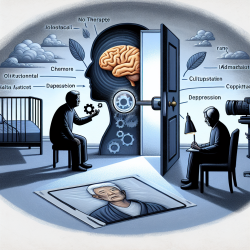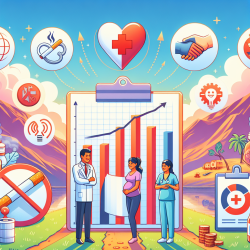Introduction
The opioid crisis continues to pose significant challenges, affecting the health-related quality of life (HRQOL) of individuals with opioid use disorder (OUD). A recent study titled "Health-related quality of life and recovery capital among recovery residents taking medication for opioid use disorder in Texas" offers valuable insights into the predictors of HRQOL and the role of recovery capital (RC) in enhancing recovery outcomes. This blog explores how practitioners can leverage these findings to improve their skills and outcomes for children and adults dealing with OUD.
Understanding Recovery Capital and HRQOL
Recovery capital refers to the resources available to individuals to initiate and sustain recovery from substance use disorders. The study identifies personal and total RC as significant predictors of HRQOL among recovery residents. The research highlights that while social RC does not significantly impact HRQOL, personal RC, which includes mental and physical health, plays a crucial role in improving recovery outcomes.
Key Findings and Their Implications
The study found that individuals over 35 years old and those with comorbid conditions were more likely to report mobility and pain/discomfort problems. Female participants reported higher pain/discomfort issues than males, and sexual minorities experienced more anxiety/depression problems compared to heterosexual participants. These findings underscore the need for tailored interventions that address specific demographic and health-related challenges.
Practical Applications for Practitioners
- Comprehensive Assessments: Practitioners should conduct thorough assessments of personal RC to identify areas where individuals may need additional support. This includes evaluating mental and physical health, educational/vocational skills, and self-efficacy.
- Interdisciplinary Care: Integrating care for comorbid conditions, especially mental health issues, is crucial. Practitioners should collaborate with healthcare providers to offer holistic treatment plans that address both OUD and associated health problems.
- Tailored Interventions: Developing gender-specific and culturally competent interventions can help address the unique challenges faced by different demographic groups, such as women and sexual minorities.
- Enhancing Personal RC: Practitioners should focus on strengthening personal RC by providing resources and support that enhance individuals' self-efficacy and coping skills.
Encouraging Further Research
While this study provides valuable insights, there is a need for further research to explore the nuances of RC and HRQOL among diverse populations. Practitioners are encouraged to engage in research initiatives that examine the impact of different types of RC on recovery outcomes. Such efforts can inform the development of more effective interventions and policies.
Conclusion
The findings from the study offer a data-driven foundation for enhancing practitioner skills and improving recovery outcomes for individuals with OUD. By focusing on personal RC and integrating comprehensive care strategies, practitioners can significantly impact the HRQOL of their clients. For those interested in delving deeper into the research, the original paper can be accessed here: Health-related quality of life and recovery capital among recovery residents taking medication for opioid use disorder in Texas.










